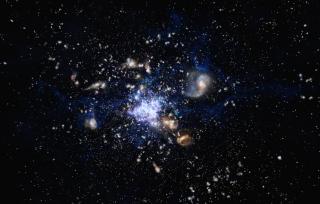Bibcode
Emonts, B. H. C.; Lehnert, M. D.; Dannerbauer, H.; De Breuck, C.; Villar-Martín, M.; Miley, G. K.; Allison, J. R.; Gullberg, B.; Hatch, N. A.; Guillard, P.; Mao, M. Y.; Norris, R. P.
Referencia bibliográfica
Monthly Notices of the Royal Astronomical Society: Letters, Volume 477, Issue 1, p.L60-L65
Fecha de publicación:
6
2018
Número de citas
76
Número de citas referidas
67
Descripción
The circumgalactic medium (CGM) of the massive Spiderweb Galaxy, a
conglomerate of merging proto-cluster galaxies at z = 2.2, forms an
enriched interface where feedback and recycling act on accreted gas.
This is shown by observations of [C I], CO(1-0), and CO(4-3) performed
with the Atacama Large Millimeter Array and Australia Telescope Compact
Array. [C I] and CO(4-3) are detected across ˜50 kpc, following
the distribution of previously detected low-surface-brightness CO(1-0)
across the CGM. This confirms our previous results on the presence of a
cold molecular halo. The central radio galaxy MRC 1138-262 shows a very
high global L^'_CO(4-3)/L^'_CO(1-0) ˜ 1, suggesting that
mechanisms other than FUV-heating by star formation prevail at the heart
of the Spiderweb Galaxy. Contrary, the CGM has L^'_CO(4-3)/L^'_CO(1-0)
and L^'_[C I]/L^'_CO(1-0) similar to the ISM of five galaxies in the
wider proto-cluster, and its carbon abundance, X_[C I]/X_H_2, resembles
that of the Milky Way and star-forming galaxies. The molecular CGM is
thus metal-rich and not diffuse, confirming a link between the cold gas
and in situ star formation. Thus, the Spiderweb Galaxy grows not
directly through accretion of gas from the cosmic web, but from recycled
gas in the CGM.
Proyectos relacionados

Gas Molecular y Polvo en Galacias através del Tiempo Cósmico
Dos cuestiones fundamentales en la Astrofísica son la conversión de gas molecuar en estrellas y cómo este proceso físico depende del entorno en todas las escalas, desde sistemas planetarios, cúmulos estelares, galaxias hasta cúmulos de galaxias. El objectivo principal de este proyecto es el de estudiar la formación y evolución de galaxias a partir
Helmut
Dannerbauer